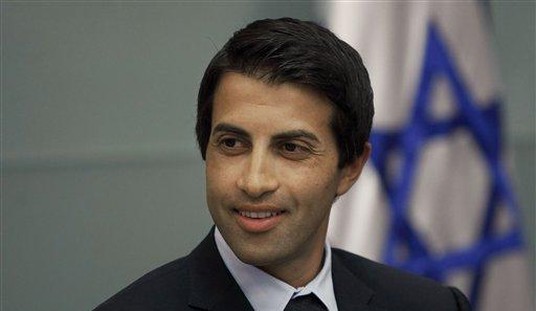“Defend Arendt, Demonize the Tea Party,” as spotted by Jonathan S. Tobin of Commentary. In the midst of a lengthy post on the controversies surrounding Hannah Arendt’s book Eichmann in Jerusalem, which popularized her thesis on “the banality of evil,” and the recent bio-flick on Arendt, Tobin notes:
The film has, like the book that inspired it, gotten mixed reviews. But perhaps none of those who like it are as impassioned as Bard College’s Roger Berkowitz, who heads the Hannah Arendt Center for Politics and the Humanities at the school. Berkowitz’s column in the on-line edition of the New York Times earlier this week is a compendium of every possible defense that could be arrayed in favor of his center’s namesake. He sees her and her embattled volume as the font of philosophical truth and insight. Despite the weight of historical evidence that Arendt missed, Berkowitz claims her view of Eichmann as being not motivated by fanaticism but by the impulse of a “joiner” who will do anything for a movement that gives his life meaning is true. That is poor history that has been debunked countless times by historians with a better grasp of the issue than either Arendt or Berkowitz. But what really troubles me is the final paragraph of Berkowitz’s love letter to the late Arendt:
At a time when confidence in American institutions is at an all-time low, Arendt’s insistence that we see Eichmann as a terrifyingly normal “déclassé son of a solid middle-class family” who was radicalized by an idealistic anti-state movement should resonate even more urgently today. That is ever more reason to free Arendt’s book, once again, from the tyranny of the conventional wisdom.
While he doesn’t say so bluntly, it’s hard to escape the conclusion that Berkowitz is making a not terribly subtle reference to those middle-class Americans who want smaller government and a less intrusive federal oversight of their lives as being somehow the moral equivalent of Eichmann. I’ve read more than my share of attempts to justify Arendt’s banality of evil thesis, but this is the first that attempts to enlist her in the fight against the Tea Party.
The sheer chutzpah as well as the colossal inappropriateness of Berkowitz’s insinuation is, by itself, enough to disqualify him as a rational voice about the subject. But let’s dignify his smear to the extent of pointing out one very important inaccuracy of his conclusion. Contrary to his assertion, Nazism was not an “anti-state movement” whether one wishes to call it “idealistic” or monstrous. It was, in fact, a classic example of a movement that worshiped the state and sought to sacrifice individual rights on the altar of the collective. In the case of Germany, it was the glorification of the German state and its leader while in Russia it was the socialist ideal and a different evil monster. Anyone who doesn’t understand that doesn’t understand the Nazis, Eichmann or the Holocaust he helped perpetrate.
Jonah Goldberg liked to ask college kids while formulating the thesis for his best-selling 2007 book Liberal Fascism, “Except for the murder, bigotry and genocide, what is it exactly that you don’t like about Nazism?” Conversely, to paraphrase an observation from Glenn Reynolds in 2009 and 2010, when the Tea Party first burst onto the scene, it had to be the first “Totalitarian” movement in the history of mankind that, if it gets everything it wants…will leave you the hell alone. (To borrow from a post I wrote in 2011, when Richard Cohen of the Washington Post also invoked Arendt to attack the Tea Party from the left.)
As Tobin writes, “Anyone who doesn’t understand that doesn’t understand the Nazis, Eichmann or the Holocaust he helped perpetrate.” Back in the mid-’70s, after they shared a symposium together, Tom Wolfe quoted German intellectual Günter Grass in his Purple Decades anthology:
“For the past hour I have my eyes fixed on the doors here,” he said. “You talk about fascism and police repression. In Germany when I was a student, they come through those doors long ago. Here they must be very slow.”
Grass was enjoying himself for the first time all evening. He was not simply saying, “You really don’t have so much to worry about.” He was indulging his sense of the absurd. He was saying: “You American intellectuals—you want so desperately to feel besieged and persecuted!”
That’s been particularly true of the fantasies the left have built up since 2009 over the Tea Party, conservatives and libertarians. The Paranoid Style, indeed.
(Incidentally, Tobin also linked to a lengthy essay on the Arendt bio-movie and the limitations of her “banality of evil” formulation, and her coverage of Eichmann’s trial that’s also well worth your time.)










Join the conversation as a VIP Member